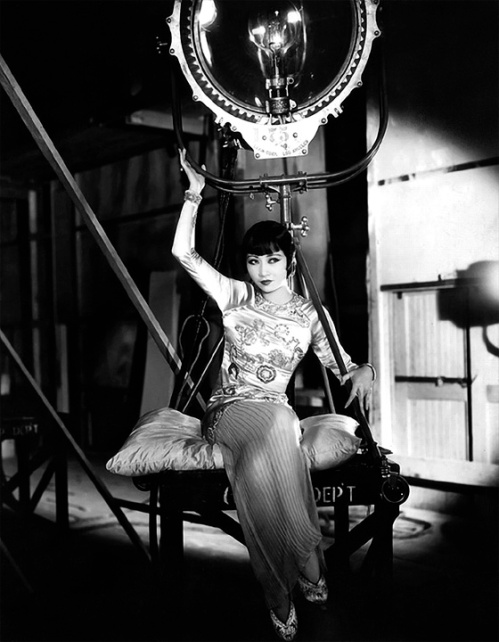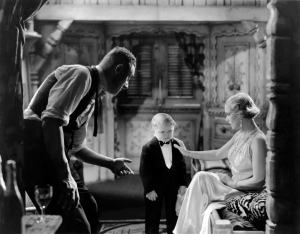When Were You Born? [William McGann, 1938]
Although it’s an interesting time capsule, this is a painfully earnest movie with a limited plot done in a flat way. The early sequence onboard a luxury liner is fascinating in a time-capsule way, but after the murder the film gets really slow for an hour as Anna May Wong gradually convinces the cops that this obscure “ancient Chinese astrology based on the Greek zodiac” technology can really uncover somebody’s secret criminal nature more reliably than old-fashioned police intuition. After the 5th or 6th revelation that this modest Asian lady’s connection to the stars lets her know more about the rest of us than a clean and sober Sherlock Holmes equipped with Batman’s cell phone spy network, the cops start doing what she suggests — and there’s a pretty cool chase through Chinatown followed by justice.
The introductory spiel by Rosicrucianologist, motivational speaker, UFO enthusiast and philosophical theorist of Masonic soteriology Manly P. Hall builds up the movie to sound about five hundred times as important as the murder mystery it turns out to be. When you look at the introduction, the cast being listed by zodiac sign, and the random melding of incompatible cultures, you get what looks like an artifact of a fleeting intellectual fad, albeit one with an unusually benign view of the Mysteries of the Orient.
Everything about When Were You Born? is half-assed, making all the more maddening its suggestions that things which are obviously impossible are obviously possible and people are crazy not to open their minds. How does this astrology stuff work? Is it supernatural or not? Why aren’t the police using Anna May Wong’s amazing powers on any other cases, now that they’re convinced? Manly P. Hall must have been really disappointed in how this turned out.
Nice touch: the stock newspaperman is named “Juggler Barrows”. “Juggler”, I guess, because he’s always doing a bunch of things at once, always striving, got his finger in a dozen pies and his ear to the ground and his eye out for a hot scoop. Yeouch.

Noted style icon Anna May Wong (seen here in Nikola Tesla's cloning device) is in no way stylish or vampish in "When Were You Born?". She's the maiden aunt who uses her knowledge of human nature to figure out whodunit, except she has no knowledge if she doesn't know your birthday.
Thirteen Women [George Archainbaud, 1932]
This one is dumb too but in a captivating way, looking and sounding a lot better than WWYB?. It’s a pretty relentless horror thriller – there’s no surprises, but there’s a lot of eerie moments, like the look in Myrna Loy’s eyes, the moment when the Swami Yogadachi becomes a pawn, the desperation of Irene Dunne when her son keeps getting suspicious gifts…the emotions are pretty intense and it’s hard to look away from the close-ups. Donald C. Willis compares it to Village of the Damned, in that the victims harm themselves when they can’t ignore thoughts someone else is putting in their heads. The idea of killing people by sending them really bleak horoscopes and then relying on them to commit suicide seems…like it would be a bit unreliable. Climactic scenes are on a train and are much more exciting than anything in the first 80% of the movie.
It’s based on “Tiffany Thayer’s startling book“, which is an understatement based on Wikipedia’s description of said novel. The Irene Dunne plot would be enough for a movie in itself, without all the other women, without the trapeze malfunction, without even the Swami Yogadachi. I liked how amazingly implausible elements, like the chauffeur’s double life, are treated so matter-of-factly, sacrificing scary/dramatic moments for the sake of making the story somewhat believable. Myrna Loy’s evil mastermind [being a “half-Hindoo, half-Japanese” woman who came here from India, her name is “Ursula Georgi” of all things] has some long and sincere speeches about her isolation at school, and how irrational it was that “you whites and your Kappa society” refused to accept her. The commercial failure of this movie might have to do with how this character, who looks like a stereotypical villain, gets to explain herself in an articulate way instead of just being a target for boos and hisses. [Kind of like Freaks.] See Filmbrain’s “The Orientalization of Myrna Loy” for more.
 She’s made up here to look a lot like Merle Oberon in The Scarlet Pimpernel, albeit with warped eyes and eyebrows, and hair severely pulled back. If Thirteen Women had been made three years later it might be better because it might have had Oberon, who was an actual mixed-race woman who came to Britain from India. The mostly-female cast is an interesting mix and all the actresses are good. Irene Dunne is great as a mother, I don’t remember Jill Esmond’s character but I do now know that she was married to Laurence Olivier, and I think it’s Mary Duncan whose exclamation of “Hazel Cousins!” has just stuck with me, as one of those one-person inside jokes. Hazel Cousins herself has a strangely truncated part in the movie, which makes sense when you learn that between the time the film was shot and when it was released, actress Peg Entwhistle committed suicide in the most melodramatic way possible.
She’s made up here to look a lot like Merle Oberon in The Scarlet Pimpernel, albeit with warped eyes and eyebrows, and hair severely pulled back. If Thirteen Women had been made three years later it might be better because it might have had Oberon, who was an actual mixed-race woman who came to Britain from India. The mostly-female cast is an interesting mix and all the actresses are good. Irene Dunne is great as a mother, I don’t remember Jill Esmond’s character but I do now know that she was married to Laurence Olivier, and I think it’s Mary Duncan whose exclamation of “Hazel Cousins!” has just stuck with me, as one of those one-person inside jokes. Hazel Cousins herself has a strangely truncated part in the movie, which makes sense when you learn that between the time the film was shot and when it was released, actress Peg Entwhistle committed suicide in the most melodramatic way possible.
Freaks [Tod Browning, 1932]
The lasting impression you get of Freaks is all the little everyday scenes of the circus. Bathing, gossiping, flirting, celebrating a birth, lighting cigarettes without arms or legs, wearily shooing a seal into a trailer. Any scenes where the “freaks” seemed at ease with each other, or confident in what they were doing, were fascinating. There’s no attempt to show any of them [other than the “pinheads”, as in Zippy — his dress is based on a microcephalic from this movie] as childlike or foolish. They’re prepared for normal-looking people [“civilians”? “normals”? What’s the word?] to condescend to them, and they’re prepared for normals to treat them with respect. Affairs and romances among freaks, and even between freaks and normals, are treated with humor, not as an insult to nature. There’s a couple great moments with the conjoined sisters Violet and Daisy, and how one can feel it when the other’s touched.
That’s part of the legend of the movie — how it was ahead of its time in not treating the characters as monsters, how it was too ambitious even for a director coming off the success of Dracula, how it was critically wounded by cuts by the studio and ended up neither a successful drama not a successful chiller. To my mind the failure is more in the crime story that provides its plot. This was based on part of the story Spurs by Tod Robbins, as indicated in the credits, and much like Thirteen Women, the film’s plot is substantially less weird than the source material. The crime story [a particularly neotenous but dignified dwarf named Hans is betrayed by Cleopatra, the normally proportioned trapezeuse who marries him for his inheritance] is hackneyed and it just isn’t affecting. It’s melodrama transplanted from a Grimm’s Fairy Tale into the middle of a realistic and human milieu. Amid dialogue like this…
- Venus [wearing cute hat]: Well, make it snappy. I’m all dolled up for the occasion.
- Phroso [sitting in bathtub]: Sorry, kid. Can’t do it now. We’ll make it some other time, eh?
[he slides through hole in bathtub, she turns away.] Aw, don’t feel that way about it. I just got this idea all of a sudden, I gotta finish it. Hey, funny gag, isn’t it? - Venus [sarcastic]: Yeah. I’m laughing myself sick.
- Phroso [approaching her for an embrace]: Aw, say! Come on. Honey, hey! Come on, come on, come on. Now, now, now, now. There, much better.
…we have Frieda saying things like “Oh, Hans. This is the first time since we have been engaged you have spoken to me so. Why is it?”
Harry Earles was a sought-after silent star and the actor of choice for roles requiring men to impersonate toddlers [WFMU’s Beware of the Blog really is the best blog ever], but he’s not nearly as natural here as the other freaks. He has a German accent and a very high reedy voice, his good-girl love interest [who’s obviously his sister] sounds similar, the femme fatale has a Russian accent, and the 1932 recording technology just makes the viewer strain to hear what’s going on. I wished I was watching all the other characters instead, the creative guys and gals from Baltimore or Brooklyn or Iowa or wherever. W.r.t. the studio’s extensive re-cutting, I think the carnival-barker framing device and the Road to Utopia-style happy ending were improvements. Anyone would probably love to see the “number of comedy segments” that were cut, but the more graphic elements of the violent climax wouldn’t have added much.
Almost the whole film takes place during the circus’s engagement in one place, so when the wagons where they live finally start getting pulled to the next town, you get exciting action on moving vehicles. The energetic slices of life in Freaks are worth anyone’s time, and the slow and awkward exchanges between Cleo and Hans are balanced by her fun scenes with co-conspirator Hercules [the charismatic Henry Victor]. Don’t expect to be terrified, unless you think you might faint just from seeing a girl born with no arms doing everyday things.
If Netflix asked, Freaks would get “Really Liked It”, Thirteen Women “Liked It”, and When Were You Born? “Didn’t Like It”.


